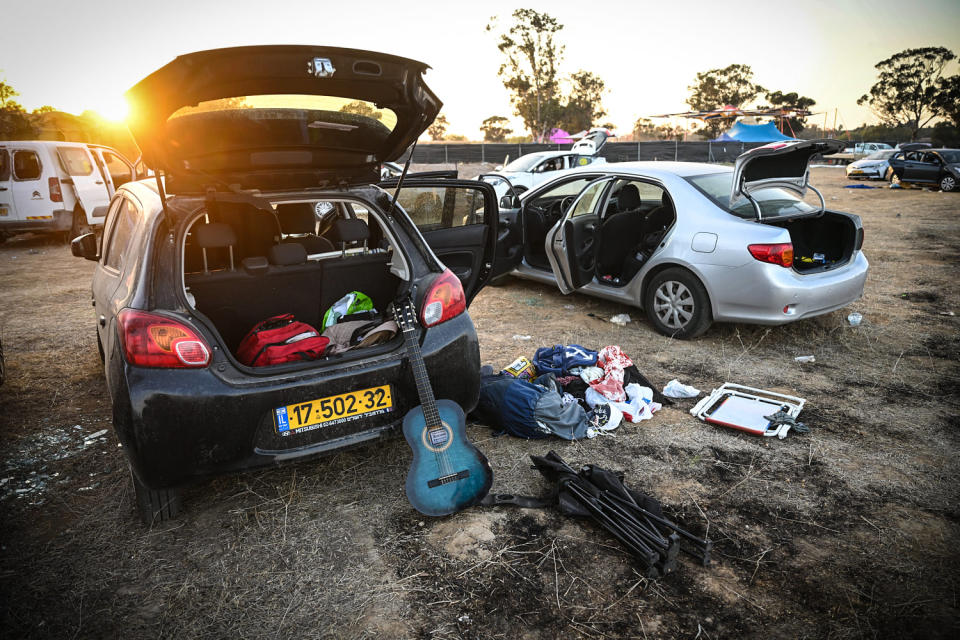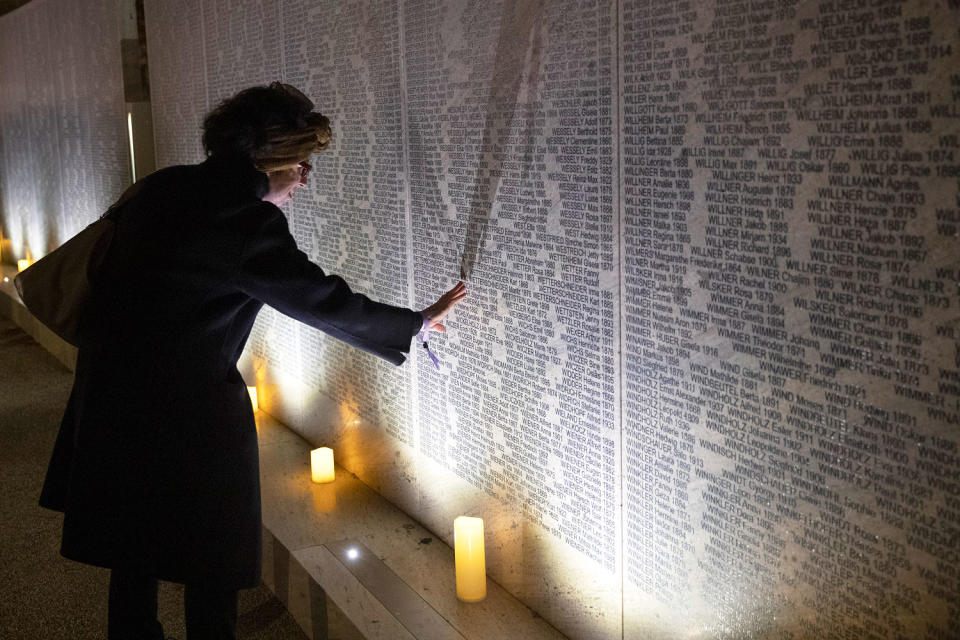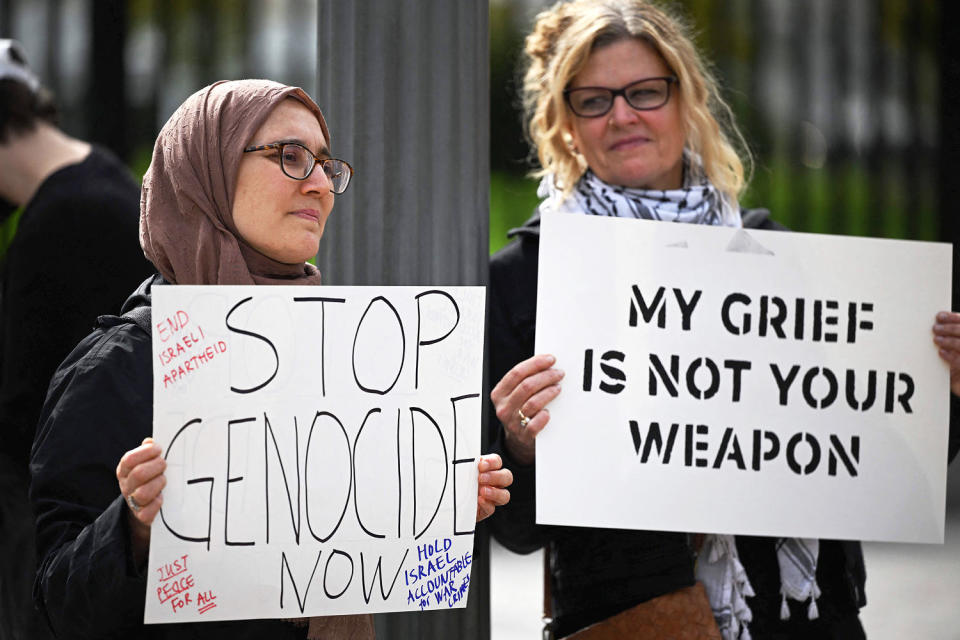Hamas attack evokes memories of the Holocaust for many Jews
- Oops!Something went wrong.Please try again later.
When terrorists stormed into southern Israel and killed more than 1,000 people on Oct. 7, Rena Quint, an 87-year-old Holocaust survivor who lives in Jerusalem, flashed back to the horrors of the 1940s.
“I was thinking of the mothers and fathers and babies killed in the Holocaust,” Quint said in a phone interview this week from her apartment, fighting back tears. She learned families were killed and thought of her own parents and siblings, who were massacred by the Nazis when she was a young girl. She learned that dozens of people were taken captive and thought of her internment at the Bergen-Belsen concentration camp in Germany.
The terror attack in southern Israel has evoked agonizing memories for many Jewish people around the world — including people in Israel who once saw the Jewish state as a refuge from violence. World leaders like Israeli Prime Minister Benjamin Netanyahu and President Joe Biden have drawn explicit parallels between the Oct. 7 assault and the Holocaust, when 6 million Jews were annihilated by Adolf Hitler’s Nazi regime.

But not everyone is comfortable with this stark comparison, and some have expressed reservations about how Netanyahu’s war Cabinet could use the horrors of the past to rally support for its military actions in the Gaza Strip and the West Bank.
Israel’s airstrikes in Gaza have likewise stirred memories of an epochal event for the Palestinian people: the Nakba (Arabic for “catastrophe”), when Palestinian people were displaced and dispossessed during the 1948 Arab-Israeli war. More than 3,700 people in Gaza had been killed in the latest conflict as of Thursday, according to the Palestinian Health Ministry.
Palestinian Authority President Mahmoud Abbas expressed concern that the Israeli government’s calls for Palestinian civilians in northern Gaza to move south could turn into a “second Nakba.” The rapidly deteriorating conditions in Gaza have stoked global concerns about a major humanitarian crisis, with many groups saying Israel may have breached international law by exercising collective punishment.
Israel and the U.S. consider Hamas a terrorist organization, and Biden described it as “a group whose stated purpose for being is to kill Jews.”
‘It’s a Shoah’
In the eyes of many Jewish people, the Holocaust has long been seen as a singular evil without a clear modern equivalent. But in the wake of the surprise Hamas assault, some have felt moved to compare this month’s violence to Hitler’s genocide.
“For as long as I can remember, I have made sure not to use the word ‘Shoah’ in any context, except for the Shoah,” Israeli political commentator Ben Caspit wrote in the daily Ma’ariv, referring to the Holocaust by its Hebrew name.
But “when Jewish children hide in shelters and their desperate parents pray that they won’t cry, so that rioters don’t come in and set the house on fire for them,” he added, “it’s a Shoah.”

In responding to the Hamas attack, some world leaders have directly connected the past to the present in stark terms, speaking to the sense of trauma felt by many Jewish people around the world.
Biden has mourned what he called “the deadliest day for Jews since the Holocaust” and decried the Hamas assault as “barbarism that is as consequential as the Holocaust.” Netanyahu likened the killings at a music festival to the Babi Yar massacre of 1941, when more than 33,000 Jews were killed over the course of two days in Kyiv, the capital of Ukraine.
“I understand on a personal level the harrowing echoes that Hamas’ massacres carry for Israeli Jews — indeed, for Jews everywhere,” Secretary of State Antony Blinken said during a visit to Israel on Oct. 12. In prepared remarks, Blinken referred to his stepfather, Samuel Pisar, who he said survived internment at the Auschwitz, Dachau and Majdanek concentration camps.
Dov Forman, 19, a university student who lives in London, said there were “no words to describe the pain that my great-grandmother is feeling right now.” Forman’s great-grandmother, 99-year-old Lily Ebert, survived the Auschwitz camp and in recent years built a large following on the social media platform TikTok with videos aimed at combating Holocaust denial.
“It’s important to understand that many of the people in Israel who were murdered and many of those who were taken hostage are the grandchildren and great-grandchildren of Holocaust survivors, just like myself,” Forman said, adding that his family was trying to shield Ebert from the graphic photos and videos that have circulated online since the attack.
Renée Silver, 92, a Holocaust survivor who lives in New York, saw the Hamas assault as the latest manifestation of antisemitism that has stalked Jews for centuries, including in the U.S., where she fears religious hatred is on the rise.
But not all survivors of Hitler’s genocide were prepared to equate the terror attack and the Holocaust. Esther Senot, 95, a survivor who was imprisoned at three concentration camps as a girl and now lives in Paris, said in an interview in French that “you cannot compare what is happening in Israel with the Shoah.”
“What happened in Israel happened on the ground all in a matter of hours,” Senot said, whereas the Nazis rounded up and deported European Jews, killing them systematically at labor and death camps over years.
She was critical of Netanyahu and the actions of regional leaders that have meant “we are always left with no way to dialogue,” she said.
“For the longest time, I have been anticipating this kind of thing,” she added. “It’s a catastrophe.”
‘My grief is not your weapon’
In the minds of many people who oppose the Israeli government, Israel’s treatment of Palestinians has long been a form of ethnic persecution. Raz Segal, a professor of Holocaust and genocide studies at Stockton University in New Jersey, wrote in the progressive Jewish Currents last week that Israel’s “assault on Gaza” was a “textbook case of genocide.”

Meanwhile, some critics of Netanyahu’s administration have raised concerns that rhetoric invoking the Holocaust could be used to justify an excessive military campaign in Gaza.
In a protest outside the White House on Monday, some Jewish activists who oppose the current Israeli government held up signs that said: “My grief is not your weapon.”
Mairav Zonszein, a senior analyst with the International Crisis Group, a think tank based in Brussels, said some Western leaders who have made references to the Holocaust are speaking to the “trauma and shock and cruelty” felt by many Jews. But on the other hand, she expressed concern over the “politicization” of the Holocaust as Israel prepares for a potentially massive ground assault on Gaza.
“I think it’s very dangerous because those kinds of analogies can be used … to justify responses by Israel with no restraints,” Zonszein said, adding that “even if you feel like Hamas acted in a genocidal way, that certainly shouldn’t justify responding in a genocidal fashion, which I think some people are concerned Israel is doing.”
This article was originally published on NBCNews.com

